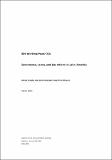| dc.contributor.author | Lledo, Victor | |
| dc.contributor.author | Schneider, Aaron | |
| dc.contributor.author | Moore, Mick | |
| dc.coverage.spatial | Brazil | en_GB |
| dc.coverage.spatial | Mexico | en_GB |
| dc.coverage.spatial | Argentina | en_GB |
| dc.coverage.spatial | Colombia | en_GB |
| dc.coverage.spatial | Venezuela | en_GB |
| dc.coverage.spatial | Costa Rica | en_GB |
| dc.coverage.spatial | Guatemala | en_GB |
| dc.coverage.spatial | Peru | en_GB |
| dc.date.accessioned | 2014-06-10T15:57:03Z | |
| dc.date.available | 2014-06-10T15:57:03Z | |
| dc.date.issued | 2004 | |
| dc.identifier.citation | Lledo, V., A. Schneider & M. Moore (2004) Governance, taxes, and tax reform in Latin America. Working paper series, 221. Brighton: IDS. | en_GB |
| dc.identifier.uri | https://opendocs.ids.ac.uk/opendocs/handle/20.500.12413/4016 | |
| dc.description.abstract | In the 1980s, Latin American countries began to implement a set of tax reforms inspired in large part by
the international financial institutions and ideas associated with the Washington Consensus. These reforms
involved above all the simplification of tax structures and the removal of exemptions and special
privileges; the replacement of trade taxes by value-added taxes; and an emphasis on improved tax
administration. Although not fully implemented, these reforms have generally been useful. However, they
have come at a price: other issues have been driven and kept off the tax policy agenda. The excluded
issues include considerations of equity and redistribution; and a serious concern for governance questions
– the interactions between tax policy and the legitimacy of governments and the policies they pursue. In a
rather quieter way, many Latin American governments recently have initiated a series of “indigenous” tax
reforms. These owe little to the support or urging of international financial institutions, are designed to
deal with particular local problems, begin to address some of the more important political dimensions of
tax reform, and have been modestly successful. These indigenous reforms provide a basis on which Latin
American countries could build a more wide-ranging programme of tax reform tailored to regional and
national circumstances. Such a programme could and should focus more on the political and governance
dimensions of taxation and attempt to build something resembling national “social contracts” around
issues of public revenue and expenditure. | en_GB |
| dc.language.iso | en | en_GB |
| dc.publisher | IDS | en_GB |
| dc.relation.ispartofseries | IDS working papers;221 | |
| dc.rights.uri | http://www.ids.ac.uk/files/dmfile/IDSOpenDocsStandardTermsOfUse.pdf | en_GB |
| dc.subject | Finance | en_GB |
| dc.subject | Globalisation | en_GB |
| dc.subject | Governance | en_GB |
| dc.subject | Participation | en_GB |
| dc.subject | Politics and Power | en_GB |
| dc.title | Governance, taxes, and tax reform in Latin America | en_GB |
| dc.type | IDS Working Paper | en_GB |
| dc.rights.holder | Institute of Development Studies | en_GB |
| dc.identifier.koha | 146727 | |

